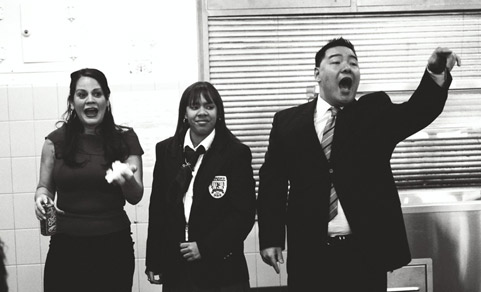2010 CAAM Fellow Scotty Iseri created “The Digits“, an interactive web series and app designed for children aged 7-11 to learn math, while combining live action comedy and gameplay. As the “greatest unknown band in the galaxy”, The Digits turns players into learners, as they make their way to the Intergalactic Battle of the Bands to defeat the evil Doomfinger.
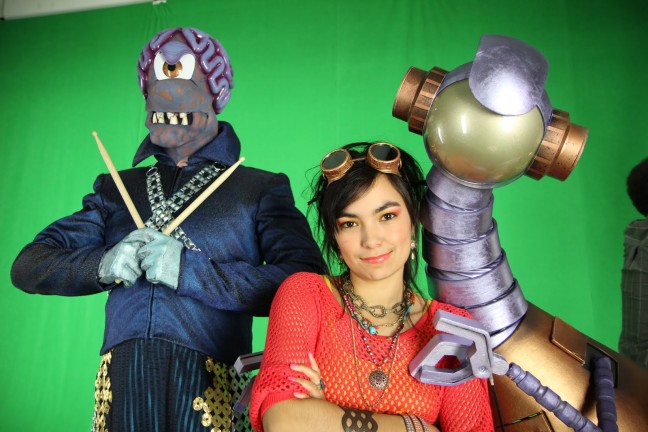
watchthedigits.com
www.youtube.com/FUNDAwatch
“The Digits” launches to the App Store and may help kids improve math skills [SFGate]
Meet the Digits:
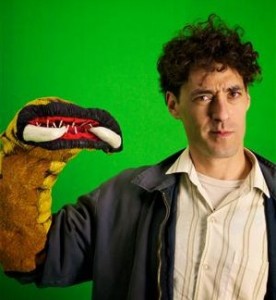 Below is a conversational interview between Scotty Iseri, creator of “The Digits” with CAAM staffers Mike Kwan (Digital and Interactive Media Manager) and Ellen Park (Media Fund Manager).
Below is a conversational interview between Scotty Iseri, creator of “The Digits” with CAAM staffers Mike Kwan (Digital and Interactive Media Manager) and Ellen Park (Media Fund Manager).
Want to meet the Digits? The cast and crew will be in Las Vegas Jan. 8th-10th for the International Academy of Web Television Awards (IAWTVA) which has nominated “The Digits” for Best Educational Series.
Reactions
Mike: What have you heard from both kids and adults?
Scotty: Well, I had one parent email saying that her kid goes for an hour with it, which is a long time for an app, you know, you usually go on here and there. It’s something that kept her attention for a long time. In terms of the kids, one kid said, “I like how much smarter I am now.” People try to make educational stuff that’s fun so kids don’t know they’re learning, but I think kids like learning. I think they like the empowerment of it. Kids will always say, “guess what,” and they want to tell you something that they know. One parent sent me a picture of her kid who had made homemade Digits costume for Halloween. It was so sweet and the costumes looked pretty great. They did a good job. They’ll be doing cos-play next year.
Mike: I was pretty engaged with it. This is the kind of thing where if we had kids then we wouldn’t mind watching it and going over it with them.
Ellen: There’s an educational value for the parent. It’s a family activity.
Scotty: Yeah, I think a lot of people produce down for kids. Some people would just put in fart jokes, kids like fart jokes, right? And who doesn’t like fart jokes, really? But I think kids are a really smart audience. They can be really finicky if you break the rules of your storytelling. You should strive for something that’s not for kids but something that families can enjoy too.
Ellen: We loved the pop culture references for sure.
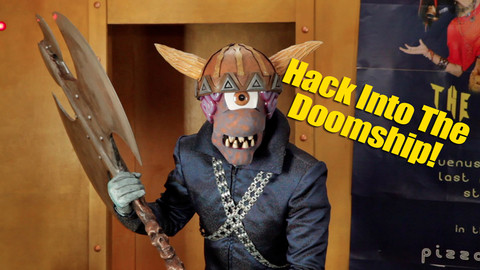
Ellen: Are you thinking of having guests come on?
Scotty: Yeah, we do have a couple of guests lined up. We just had Cara Santa Maria who is the science blogger for the Huffington Post. We have a couple rock star guests that will be out next year so they’re under wraps at the moment. My favorite guest so far would be from the episode we just got out. We had a classroom from Idaho make a video and send it in and they asked the Digits questions and the Digits had to answer it.
Ellen: So that was of their own volition? They just decided to send you guys a video?
Scotty: There was a teacher from the school district from Idaho that does an after school program. I met with her a year and a half ago when I was first coming up with The Digits and finding ways for kids to interact with it. And once we launched, she got in touch again and said, “Hey I got this after school math program. Can they ask the Digits a question?” So I helped her out a little bit on how to record a video and the technical stuff. Hopefully we get some more of those. We did have a couple of questions that kids asked in the comments section as well, so we can do responses to that.
Ellen: Are you open to user-generated content in the future?
Scotty: Yeah definitely. I think it’s language that kids are really comfortable and familiar with. They don’t know PBS, but they know YouTube these days.
On Learning, Torture and Play

Ellen: So Kumon is like a legal form of torture for children and it’s very popular with Asian parents. Basically you spend your childhood sitting there and doing multiplication tables. And yeah, it has its uses I’m sure, but it’s pretty god awful. I feel like there’s this idea of how you’re suppose to learn which is actually contrary to how learning is actually developed. And it’s not so much tricking kids into learning. So could you talk about learning through play a little bit more?
Scotty: I think what education is, broadly speaking, you get locked into this idea that this is the way that you would learn things. And memorization has been a part of that for a long time whether it’s memorizing your phonics or your times tables or how to diagram a sentence. I think one thing that games do pretty well generally speaking is that they teach you how to play themselves. As you are playing the game you’re learning the mechanics of the game and they become more fluid to you. What we’re attempting to do with The Digits is create game design and game mechanics that also teach certain mathematical skills. There are plenty of things out there, I call them digital flash cards, they’re just ways to try to drill and kill and really try to memorize those times tables, but mathematics really is kind of a language and so we’re approaching it from this idea that you learn math like a language. You work on the concepts and once you understand the concepts than the memorization kind of takes care of itself. In a way, it’s teach a man to fish kind of style of learning that we want to show kids how to do math and let them actually use math in ways that are relevant to them or relevant in the context of the game that we provide. The idea of play is how to talk about serious play or play that is meaningful. It truly is, it is the rawest form of science. You try something, see if it works, and if it fails then you try again. I think games are really good at using failure positively. You know, if you die in Super Mario Bros. you learn what not to do next time. With The Digits, we want to show that failure can be a very positive thing – it’s a great way to learn something, to fail and try again and not make it necessarily a negative thing that you failed. The goal is to fail and try again. The goal is to fail and get it next time.
On Pavi, the lead character of “The Digits”, and being “Asian American”
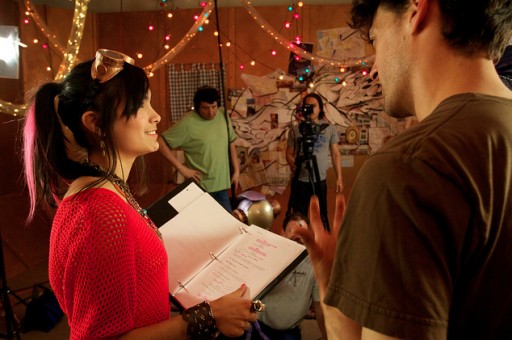
Ellen: We loved the set design. It’s incredibly impressive what you guys were able to do with I’m sure was a very limited budget. I especially loved Pavi’s outfits, she’s got a punk rock aesthetic to her. Could you talk a little about her fashion sense. Does she pick her outfits?
Scotty: Sure. All the credits of the look goes to our costume designer (See Shana Targosz www.
Ellen: I heard about the game and then when I was watching the videos I loved it. It was like throwback 80s but very stylish. Also I feel like she’s sort of timeless in a way, which works with the scifi aspect of it. It’s very retro but very forward fashion at the same time if that makes sense. Her costume design is great, so I could tell that you guys put a lot of thought into it. But also right away vividly, before she even starts talking, you know she’s going to be a fun character. And I actually found her bio to be very fascinating. So apparently she left her family on Earth very suddenly.
Scotty: Yeah, definitely. One thing we’re going to deal with in Season 2 is that she didn’t leave a note for her parents and she should have. I think you can look at some of the great kids movies or family movies in the last 20 years and a lot of them have this sense of kids being on their own and learning something. I think of The Goonies, one of my favorite movies of all time, and it’s this idea the kids going out on their own to make something happen and yeah it’s a little scary and a little worrisome. At the same time the kids in our audience, the target age is 4-5th grade, are starting to get some independence. We’re definitely going to have Pavi’s parents be part of the show in the future and have to explain where she’s been for the past 24 hours or so. It’s not that she is running away from anything bad at home, there is a loving support system there. We also wanted to steer clear from the Asian parent stereotypes a little bit, so one idea we’re tossing around for her parents is maybe they’re like San Francisco hippies and not strict enough. The actress is mixed race and I’m mixed race as well. And every time they’d have an Asian character on camera they’d have a “lets talk about my crazy beliefs instead of your crazy beliefs” kind of episode. I wanted to have a character that could just be of a different race that just is and wouldn’t have to make her different and point out differences between her and society. She could just be Asian American, not a representative of an entire race.
What’s the deal with Ray Ray? And on being smart
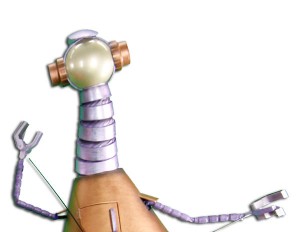
Ellen: What would Ray Ray say to kids who hate math? I think it’s clear that Ray Ray really loves math.
Scotty: A lot of credit goes to the performer, Lance Woollen, who really brought a lot to the character finding the voice. In terms of his personality, we wanted to show someone that was very smart but also fearful. It can be scary to raise your hand in class, it can be scary to be the smart one. I think that’s one of the reasons why kids really respond to Ray Ray cause he shows that it’s ok to be scared, that it’s not a bad thing. But in terms of what he’d say to kids who don’t like math, there’s a quote by Neil deGrasse Tyson, “Math is the language of the universe.” Math is how you learn science, math is how you build a rocket, and math is how you visit unexplored planets. To learn math is to learn how to do all the cool things that you want to do in the world.
The Future
Mike: Can you tell us about what you’re excited about for the future?
Scotty: So we’re starting work on Season 2 and we have some new characters, some new things coming out, some twists and turns for The Digits. We’re looking to take all the music from the series and put an album out so you can listen to the songs. Also we’re looking at other ways that we can be a part of a kid’s life. We have a set of physical buttons like little band pins that match the achievements in the game. When you get an achievement in the game, like oh cool I’m a Master Pyro Blaster in Team Fortress or whatever – having the physical representation of that helps to underscore what you learned. It helps by showing it off. It’s like the boy scouts with the merit badges. It’s a way to display the knowledge you gained. So, I’m excited about stuff like that, the other ways we can reach in and be a part of a kid’s life with the characters.
Mike: Well, thank you so much for your time today Scotty.
Ellen: Yeah, thank you it was great. We can tell that you guys put a lot of thought into the project.
Scotty: I really don’t think it would exist without the support from CAAM and the fellowship. I’ve been in touch with the other fellows. We’ve had email discussions back and forth about our various projects. It’s such a great network that you guys created. I’m really grateful to have been in the program and hope to be more active as time goes on.
Ellen: And it’s great to see how this project grew from this idea and watching it develop and now it’s an actuality. I think that’s super inspiring to our community of producers and well as our audience. So the story behind it is pretty awesome.




